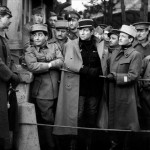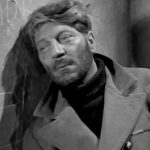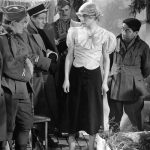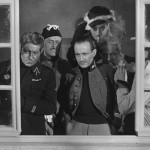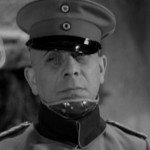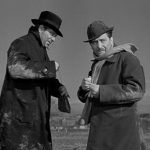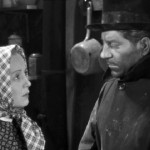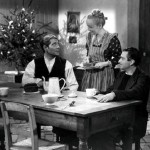
Grand Illusion – 1938
Grand Illusion was a French film directed by acclaimed director Jean Renoir. Many have called it one of the best film of all time. Actor Orson Welles was quoted, saying that Grand Illusion was one of the films that he would take with him “on the ark.” Its dialogue was mostly in French with English subtitles, but there were also smatterings of German and English.
At first, I settled in, ready for a war movie. And there is no denying that it is one, of sorts. But I think it was an unconventional war film. There were no battle scenes, no chaotic sequences of death and destruction. But it had great acts of heroism, World War I soldiers struggling against impossible odds, and a very anti-war sentiment.
And you might ask, “What was the grand illusion?” The illusion was the idea that war is good for anything. Having said that, I completely disagree with the sentiment. I think that war, while it is a terrible thing, has a place in the world. It can foster social and economic changes where no other means will work. It can put an end to injustice and punish evil-doers. It can do things that no other force on earth is capable of doing. But Grand Illusion says that it can do none of these things. All war can do is to ruin lives, hurt the nations that fight them, and kill men.
The main characters are Captain de Boldieu, a French aristocrat played by Pierre Fresnay, Lieutenant Marechal, a French officer who had been born to the lower class, played by Jean Gabin, and Lieutenant Rosenthall, a noveau riche man of Jewish ancestry. The three men are captured by the Germans and taken to a prisoner-of-war camp. While there, they meet the rest of the POWs and are welcomed into their ranks.
But here is where the main thrust of the film lies. Boldieu makes a point of remaining aloof. He sets himself apart from the rest of the men because he was born to the upper class. So while the film takes place in World War I, it isn’t really about war. It is about the differences between the classes and how the upper classes of both France and Germany dealt with the lower class men and with each other. The commanding officers on both sides of the war had a certain kinship with each other, despite being on opposite sides.
The lower class officers, while in the same situation as their aristocratic prison-mates, still bonded with each other and kept to their own classes. But another theme in the film was the idea that the time of the upper-class was ending. It was being replaced by the working class, and those of the upper class had to either acknowledge the new order or be left behind in a world that no longer existed.
Playing opposite Boldieu was the German commanding officer, Captain von Rauffenstein, played by Erich von Stroheim. The film spent considerable time following the discussions between the two men and pointing out their divergent opinions. Von Rauffenstein sees the inevitability of the rise of the working class, though he is a man who will always fight against it. He is depressed when he looks at his future, knowing that he will wither away and become a relic of the past. Boldieu gracefully accepts how the world is changing, but knows he cannot live in such a world. He has the courage to take what he calls “the better way out.” He sacrifices his life to allow the working class men to escape.
Then the story shifts gears and focuses on the futility and life-ruining aspects of war. As Marechal and Rosenthall flee across the German countryside toward Switzerland, they encounter a woman on a farm who is caring for her young daughter. Her name is Elsa and she is played by Dita Parlo. She shows the men how her husband and four brothers were all killed in the war. Ironically, they each died at a battle that was a great victory for Germany, showing how war is ultimately meaningless. Parlo did a fantastic job.
Of course, as the two soldiers stay with Elsa, she cares for them and they help her with the farm. Marechal and Elsa fall in love and when it comes time for the men to go, Marechal has second thoughts about leaving her. It was a touching and poignant romance that was handled very delicately. Well done Renoir. And well done on a very good movie.
